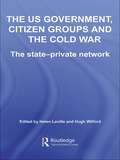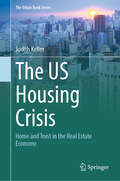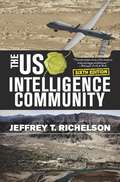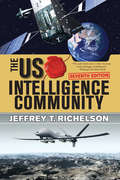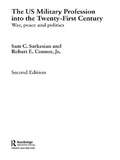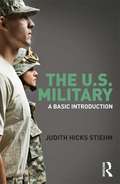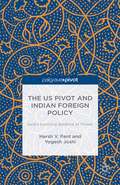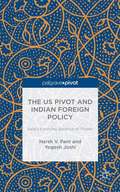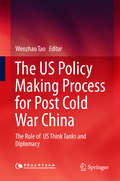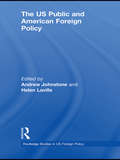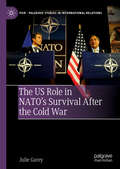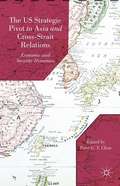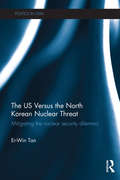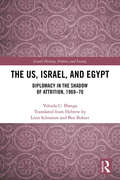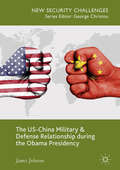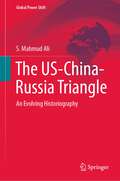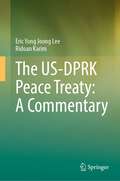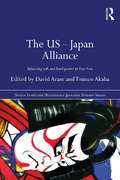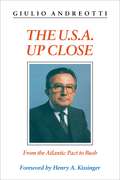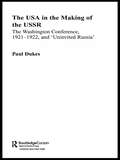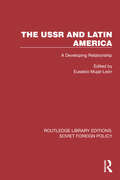- Table View
- List View
The US Government, Citizen Groups and the Cold War: The State-Private Network (Studies in Intelligence)
by Hugh Wilford Helen LavilleThis new book examines the construction, activities and impact of the network of US state and private groups in the Cold War. By moving beyond state-dominated, ‘top-down’ interpretations of international relations and exploring instead the engagement and mobilization of whole societies and cultures, it presents a radical new approach to the study of propaganda and American foreign policy and redefines the relationship between the state and private groups in the pursuit and projection of American foreign relations. In a series of valuable case studies, examining relationships between the state and women’s groups, religious bodies, labour, internationalist groups, intellectuals, media and students, this volume explores the construction of a state-private network not only as a practical method of communication and dissemination of information or propaganda, but also as an ideological construction, drawing upon specifically American ideologies of freedom and voluntarism. The case studies also analyze the power-relationship between the state and private groups, assessing the extent to which the state was in control of the relationship, and the extent to which private organizations exerted their independence. This book will be of great interest to students of Intelligence Studies, Cold War History and IR/security studies in general.
The US Housing Crisis: Home and Trust in the Real Estate Economy (The Urban Book Series)
by Judith KellerThis book aims to draw careful distinctions between the various forms of housing insecurity and personal circumstances research participants experience. While the urgency of the housing crisis in the US has produced a lot of scholarly work on housing, it often fails to recount the real life struggles that the housing crisis is causing. This is where the book provides a distinct contribution to housing studies and urban geography. The author use of trust as an analytical lens, her qualitative approach, and her work with people on the ground aim to move away from a quantitative understanding of the crisis by giving it a human face. The author seeks to bring to light the human costs of the destruction of home as well as the political reactions and day-to-day strategies that residents apply to make ends meet in times of the US housing crisis.
The US Intelligence Community
by Jeffrey T RichelsonThe role of intelligence in U.S. government operations has changed dramatically and is now more critical than ever to domestic security and foreign policy. This authoritative and highly researched book provides a detailed overview of America's vast intelligence empire--its organizations, its operations (from spies on the ground to satellites thousands of miles in space), and its management structure.Relying on a multitude of sources, including hundreds of official documents, author Jeffrey T. Richelson provides an up-to-date picture of the U.S. intelligence community that will allow students to understand the full scope of organizations and activities and give valuable support to policymakers and military operations. Fully revised throughout, the sixth edition of this definitive book includes new material on intelligence organization, foreign and domestic intelligence collection and analysis, covert action, and cooperation with foreign intelligence services.
The US Intelligence Community
by Jeffrey T. RichelsonThe sixth edition of this comprehensive overview of the United States intelligence apparatus is updated to reflect changes in organizational structures and processes as well as to take advantage of the latest publicly available sources on intelligence organizations, management and methods. Beginning with an introduction on basic intelligence principles, the volume covers national intelligence organizations, Defense Department intelligence and the DIA, service branch intelligence organizations, civilian organizations, imagery, image processing and signals intelligence, space surveillance, human intelligence assets, cooperation with foreign services, analysis, counterintelligence, covert action, national intelligence community management, Defense Intelligence management and managing intelligence collections, covert action and information access. The work includes black and white photographs, sample documents and organizations charts as well as an essential glossary of acronyms. Richelson is a senior fellow at the National Security Archive in Washington D. C. Annotation ©2011 Book News, Inc. , Portland, OR (booknews. com)
The US Intelligence Community
by Jeffrey T. RichelsonThe role of intelligence in US government operations has changed dramatically and is now more critical than ever to domestic security and foreign policy. This authoritative and highly researched book provides a detailed overview of America’s vast intelligence empire--its organizations, its operations (from spies on the ground to satellites thousands of miles in space), and its management structure. Relying on a multitude of sources, including hundreds of official documents, author Jeffrey T. Richelson provides an up-to-date picture that will allow students to understand the full scope of the US intelligence community’s organizations and activities and give valuable support to policymakers and military operations. Fully revised throughout, the sixth edition of this definitive text includes new material on intelligence organization, foreign and domestic intelligence collection and analysis, covert action, and cooperation with foreign intelligence services.
The US Military Profession into the 21st Century: War, Peace and Politics (Cass Military Studies)
by Sam Sarkesian Robert ConnorThis brand new edition of The US Military Profession into the Twenty-First Century re-examines the challenges faced by the military profession in the aftermath of the international terrorist attack on the United States on September 11, 2001. While many of the issues facing the military profession examined in the first edition remain, the 'new war' and international terrorism have compounded the challenges. The US military must respond to the changed domestic and strategic landscapes without diminishing its primary function—a function that now many see that goes beyond success on the battlefield. Not only has this complicated the problem of reconciling the military professional ethos and raison d’etre with civilian control in a democracy, it challenges traditional military professionalism. This book also studies the notion of a US military stretched thin and relying more heavily on the US Federal Reserves and National Guard. These developments make the US military profession increasingly linked to public attitudes and political perspectives. In sum, the challenge faced by the US military profession can be termed a dual dilemma. It must respond effectively to the twenty-first century strategic landscape while undergoing the revolution in military affairs and transformation. At the same time, the military profession must insure that it remains compatible with civilian cultures and the US political-social system without eroding its primary function. This is an invaluable book for all students with an interest in the US Military, and of strategic studies and military history in general.
The US Military: A Basic Introduction (Cass Military Studies)
by Judith Hicks StiehmThis book provides a basic guide to the US military and will raise questions for further discussion by students and other curious readers. The US Military provides an accessible starting-point for those with a limited knowledge of this institution. Covering a wide range of subject matter, and ending with an extensive list of suggested resources to aid individual study and research, the text is divided into the following chapters: The A, B, Cs Strategy and Doctrine The Military in Action Weapons and Capabilities The Budget This book will be of great interest to students of the US military, US politics, defense studies, and war and conflict studies, and will also be of relevance to journalists, NGO staff and diplomats.
The US Pivot and Indian Foreign Policy: Asia's Evolving Balance of Power
by H. Pant Y. Joshi SowerbuttsChina's exponential rise and America's relative decline have led to a transition of power in contemporary Asia. The US pivot towards Asia is the most evident manifestation of such a transition, and Indian foreign policy shows signs of a hedging strategy, with attempts to strengthen ties with both China and the US.
The US Pivot and Indian Foreign Policy: Asia's Evolving Balance of Power
by Harsh V. Pant Yogesh JoshiThe US Pivot and Indian Foreign Policy.
The US Policy Making Process for Post Cold War China
by Wenzhao TaoCombining a study of American Think Tanks and a study of American diplomatic policy on China following the Cold War, this book explores in detail the policy-making process, procedures and mechanisms, as well as the roles of various interest groups in the policy-making process for China-related policies. Further, it dissects the policy-making process with regard to selected sensitive policies, such as the US diplomatic policy on Taiwan, China; US trade policy on China; US human rights policy on China; and US environmental and energy policy on China; and analyzes the function and influence of the American Think Tanks in the policy debates. Characterized by its high theoretical value, wealth of historical materials and painstaking analysis, the book is not only of important academic value but also offers a valuable reference guide to support the practical work of related departments in the Chinese government.
The US Public and American Foreign Policy (Routledge Studies in US Foreign Policy)
by Andrew JohnstoneThough often overlooked, public opinion has always played a significant role in the development and promotion of US foreign policy and this work seeks to comprehensively assess the impact and nature of that opinion through a collection of historical and contemporary essays. The volume evaluates the role of organizations and movements that look to represent public opinion, and assesses the nature of their relationship with the government. The contributors utilize a number of different approaches to examine this impact, including polling data, assessments of the role of the media, and the wider consideration of ideas and ideology, moving on to examine the specific role played by the public in the policy making and policy promotion process. Engaging with new questions as well as approaching old questions from a new angle, the work argues that whilst the roles change, and the extent of influence varies, the power of the public to both initiate and constrain foreign policy clearly exists and should not be underestimated. This work will be of great interest to all those with an interest in American foreign policy, American politics and American history.
The US Role in NATO’s Survival After the Cold War (Palgrave Studies in International Relations)
by Julie GareyThis book takes a new approach to answering the question of how NATO survived after the Cold War by examining its complex relationship with the United States. A closer look at major NATO engagements in the post-Cold War era, including in the Balkans, Afghanistan, Iraq, and Libya, reveals how the US helped comprehensively reshape the alliance. In every conflict, there was tension between the United States and its allies over mission leadership, political support, legal precedents, military capabilities, and financial contributions. The author explores why allied actions resulted in both praise and criticism of NATO’s contributions from American policymakers, and why despite all of this and the growing concern over the alliance’s perceived shortcomings the United States continued to support the alliance. In addition to demonstrating the American influence on the alliance, this works demonstrates why NATO’s survival is beneficial to US interests.
The US Strategic Pivot to Asia and Cross-Strait Relations
by Peter C. Y. ChowProviding a coherent and current account of how the U. S. manages to 'pivot to Asia' amid a rising China, this book provides an insightful glimpse into China-US relations, and the complexities of the two nations' economic and defense issues as China asserts is financial and military might in Asia and beyond.
The US Supreme Court and the Centralization of Federal Authority (SUNY series in American Constitutionalism)
by Michael A. DichioThis book explores the US Supreme Court's impact on the constitutional development of the federal government from the founding era forward. The author's research is based on an original database of several hundred landmark decisions compiled from constitutional law casebooks and treatises published between 1822 and 2010. By rigorously and systematically interpreting these decisions, he determines the extent to which the court advanced and consolidated national governing authority. The result is a portrait of how the high court, regardless of constitutional issue and ideology, persistently expanded the reach and scope of the federal government.
The US Versus the North Korean Nuclear Threat: Mitigating the Nuclear Security Dilemma (Politics in Asia)
by Er-Win TanAlthough the current world order is still dominated by the US, there is increasing international concern over the possibility of regional security dilemmas arising from smaller powers’ attempts to develop Weapons of Mass Destruction. A study of US-North Korean interaction using the security dilemma as a conceptual frame of analysis is thus not only hugely topical, but also particularly relevant for the 21st century on theoretical as well as empirical grounds. Is there the prospect of a security dilemma contagion if North Korea acquire nuclear weapons capability leading to an Asia Pacific wide nuclear arms race? This book examines this contentious issue in-depth and explores the difficult choices policymakers face as a result of the uncertainty in international politics.
The US, Israel, and Egypt: Diplomacy in the Shadow of Attrition, 1969-70 (Israeli History, Politics and Society)
by Yehuda U. BlangaThis book deals with the diplomatic triangle of Israel, the United States, and Egypt during the War of Attrition along the Suez Canal in 1969–1970. Considering the Egyptian president’s political positions and outlooks on the Arab-Israeli conflict and the pan-Arab sphere, relations with the United States, the study reviews the internal disagreements between the State Department and Henry Kissinger, the national security adviser in the White House. The study demonstrates that the United States and Egypt worked together to thaw their relations after the severance of ties in June 1967, motivated by a desire to protect and advance their interests in the Middle East. The book is based chiefly on textual analysis of political and historical events in the domain of international relations, but with the same attention to internal policy as well. In addition, the research draws chiefly on primary sources that have only recently been released to the general public and that have not yet been the subject of serious analysis. The lion’s share of the work is based on qualitative content analysis of documents from the National Archives in Washington and especially of the US State Department. Providing a reading that is new, comprehensive, and complete, both with regard to the scope of the sources as well as the analysis of developments in the relations between Egypt and the United States, this book is a key resource for students and scholars interested in the Arab-Israeli conflict, political science and diplomacy, Israeli studies and the Middle East.
The US, NATO and Military Burden-Sharing (Contemporary Security Studies)
by Peter Forster Stephen J. CimbalaThis study establishes that the political, economic and military-technological changes that transform the international system also alter the way in which a state views its and others' responsibilities and burdens for responding to international crises. It assesses the distribution of the costs of raising and supporting arms of service, the risks of deploying them overseas and using them in combat or peace operations, and the extent to which members have a responsibility for maintaining international order in the context of three instances of multinational military intervention: the Multinational Force deployment in Lebanon in 1982-83; the first Persian Gulf War in 1990-91; and the UN and NATO intervention in Bosnia-Herzegovina.
The US-China Military and Defense Relationship during the Obama Presidency
by James JohnsonThis book offers a timely and compelling explanation for the deterioration of U.S.-China security relations during the Obama Presidency. The U.S.-China relationship has become one of (if not the most) vital features of contemporary world politics, and with arrival the Donald Trump to the White House in 2017, this vital geopolitical relationship sits at a precarious and dangerous crossroads. This book assesses a wide array of sources to systematically unpack the policy rhythms, drivers, and dynamics that defined the course of Sino-American security relations during the Obama-era. It fills several gaps in the literature on international security and conflict and offers a nuanced and innovative comparative approach to examine individual military domains. The case study chapters draw on recent Chinese and English sources - on military doctrine, capabilities, and defense strategy - to build a clear understanding the main sources of U.S.-China misperceptions, and highlight the problems these assessments can create for the conduct of statecraft across strategically competitive geopolitical dyads. The book builds a sobering picture of U.S.-China relations that will appeal to specialists and generalists alike with an interest in future warfare, emerging military-technologies, military studies, arms control, and foreign policy issues in the Asia-Pacific region more broadly.
The US-China-Russia Triangle: An Evolving Historiography (Global Power Shift)
by S. Mahmud AliThis book analyses international relations between the USA, China, and Russia and provides an overview of how the US-China-Russia triangle has evolved over time. Based on a forensic examination of primary documentation from US archives, the author illustrates how the US strategic perspectives on Chinese–Russian relations have developed since the late-19th century. The author demonstrates how US relations with the Russian and Chinese empires began expanding into greater sophistication and complexity in the 19th century, reflecting changing US concerns, priorities, and preferences vis-à-vis Sino-Russian dynamics which themselves, too, were evolving in parallel and, in some instances, in an interactive fashion. The book analyses US perceptions of Sino-Russian interactions in ways which, from the US perspective, affected US interests, either positively or negatively.
The US-DPRK Peace Treaty: A Commentary
by Eric Yong Lee Ridoan KarimThis book delivers an in-depth analysis of the US-DPRK Peace Treaty which will be concluded as a final result of the Korean Peninsula peace process that is currently ongoing. Since North Korea launched its nuclear weapons development program in the early 1990s, the Korean peninsula has become a critical point of global politics along with the Sino-American (G2) hegemonic competition. The US-DPRK Peace Treaty is the key to the denuclearization and de jure peace on the peninsula as well as Northeast Asia. Different from the comprehensive peace treaty between the four parties (US, China, and the two Koreas) already proposed for the past few years, the book suggests a ‘bilateral’ approach to the agreement between the US and the DPRK, which will trigger the peace as a system considering the US’s practices in this regard after 1783. Such a challenging and provocative method provides deeper understanding of the legal and political circumstances for the expected US-DPRK Peace Treaty. The book will navigate scholars, practitioners, and students towards terminating the 1953 Armistice, establishing nuclear peace as well as a rapprochement between the two countries. In practice, it will be a useful guideline for the conflicting parties in the various parts of the globe to adopt peace treaties in the twenty-first century.
The US-Japan Alliance: Balancing Soft and Hard Power in East Asia (Nissan Institute/Routledge Japanese Studies)
by Tsuneo Akaha David AraseJapan's use of Soft power in its international politics is as yet understudied. Soft power presents as many challenges as promises. This book explores the way Japan uses soft power in its relationship with the US, its Asian neighbours and Europe and aims to contribute to a deeper understanding of the role of soft power in international relations. Hard power, on the other hand, is more tangible and has received far greater scholarly scrutiny than soft power. However, as this collection makes clear, hard power has its limitations and counterproductive consequences as an instrument of policy. This book makes it clear that hard power alone will not provide Japan with the peace and security it desires. A smart balancing or mixture of hard and soft power is required. Is Japan up to this challenge? While this book cannot give a definitive answer to this question, the excellent line-up of contributors present their best analyses of the effectiveness of Japan's current attempt at balancing the two components of national power in meeting its bilateral and multilateral security challenges. The US-Japan Alliance is suitable for upper undergraduates, postgraduates and academics in International Politics, Political Science, Security studies and Japanese studies. Winner of The Masayoshi Ohira Memorial Special Prize, 2011.
The USA Up Close: From the Atlantic Pact to Bush
by Giulio Andreotti"Seeing ourselves through others' eyes is often instructive...[Prime Minister Giulio] Andreotti, a fixture of postwar Italian government, brings [to this examination of U.S. politics] a keen mind and the perspective of a political system in which charisma is suspect..."-Foreign Affairs "Rich, not only in the usual anecdotes of the author's encounters with famous Americans, but also in reflections on the moments that molded the extraordinary relationship between Italy and the U.S... [Andreotti] will be judged by historians to be, warts and all, one of Italy's, and Europe's, truly remarkable statesmen."-Choice
The USA in the Making of the USSR: The Washington Conference 1921-22 and 'Uninvited Russia' (Routledge Studies in the History of Russia and Eastern Europe)
by Paul DukesThe USA's contribution to the making of the USSR was accidental. In the belief that the Russian Socialist Federative Soviet Republic could not survive, American statesmen strove to keep the former Tsarist empire intact for a non-communist successor regime in the face of attempts by other powers to carve out spheres of influence in both European and Asiatic Russia. In this manner, they unwittingly facilitated the formation of the Union of Soviet Socialist Republics.This book shows the importance of the 'Russian question' at the Washington Conference and throws light on the emergence of the 'Versailles-Washington' system of international relations.
The USSR and Iraq: The Soviet Quest for Influence
by Bettie M. Smolanksy Oles M. SmolanskyIn The USSR and Iraq, the first major study of Soviet-Iraqi relations, Oles M. Smolansky examines the history of the relationship between these two countries during the past twenty years and attempts to dispel the misconception that the Soviet Union has enjoyed undue influence over Iraq.Drawing on ten years of research in Western, Arab, and Soviet sources, Smolansky analyzes the complex issues at the center of Soviet-Iraqi relations from 1968 through 1988, including the nationalization of the oil industry, the Kurdish question, the Iraqi Communist Party, the affairs of the Persian/Arabian Gulf, and, ultimately, the war between Iraq and Iran.Smolansky concludes that Iraq has never been under the dominant influence of Moscow, nor has it even been a loyal Soviet ally. In fact, Iraq has managed to reap major benefits from the relationship without losing its autonomy or sacrificing its major interests. The author discusses the Soviet Union and Iraq within the larger framework of the nature of influence relationships between great and small powers.
The USSR and Latin America: A Developing Relationship (Routledge Library Editions: Soviet Foreign Policy #25)
by Eusebio Mujal-LeónThe USSR and Latin America (1989) is an authoritative analysis of the Soviet Union’s strategy and policy towards the region. The contributors cover a variety of topics, including Latin America’s place in Soviet strategy for the developing world, US perceptions of Soviet strategy in the region, Soviet–Cuban relations, and relations between Latin American communist parties and the USSR.
